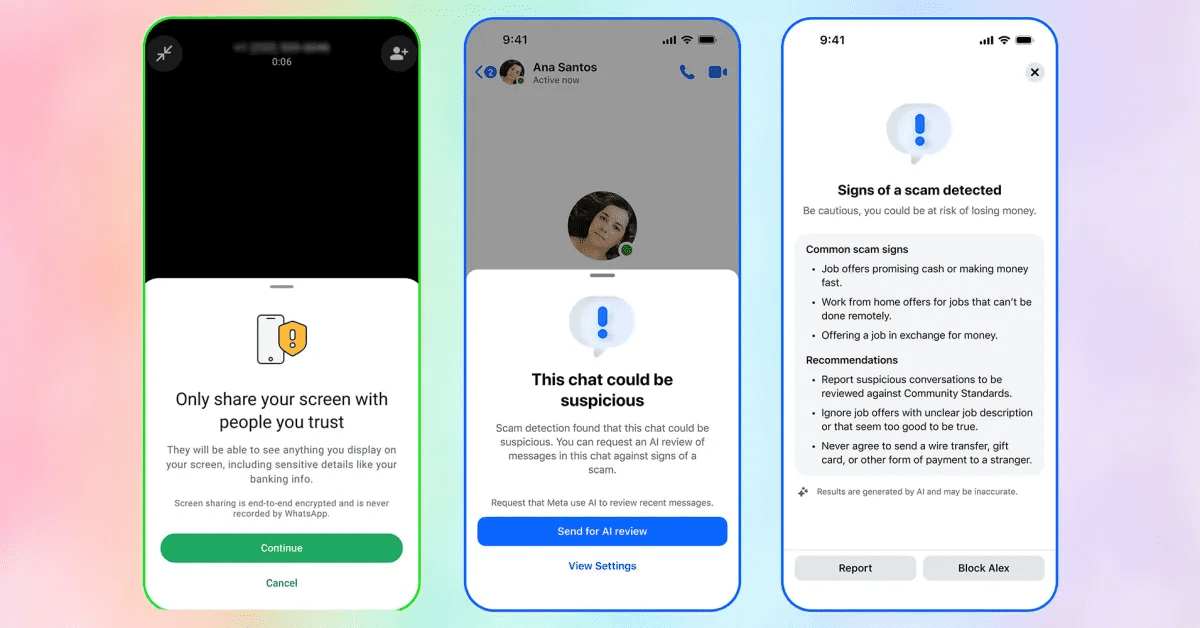Meta is rolling out enhanced scam detection features on WhatsApp and Messenger to better protect older users from online fraud. This initiative is part of a larger effort to improve safety across its platforms and disrupt scam operations.
The new updates will introduce in-chat alerts, warnings, and scam detection notifications designed to help users recognize and steer clear of suspicious activities by encouraging them to scrutinize unusual messages or requests carefully.
In response to the surge in scams targeting seniors on WhatsApp and Messenger, Meta has already eliminated nearly 8 million fraudulent accounts during the first half of 2025. These accounts were linked to scam hubs located in countries such as Myanmar, Laos, Cambodia, the United Arab Emirates, and the Philippines.
Moreover, Meta has taken down over 21,000 Facebook Pages and profiles impersonating customer support services. These counterfeit pages often attempt to trick users into divulging sensitive information like passwords, banking details, or verification codes under the pretense of resolving issues.

The prevalence of scams has reached a point where legitimate customer support messages are often ignored by Facebook Page owners, inadvertently obstructing genuine assistance.
These fraudulent schemes extend beyond social media, infiltrating messaging apps, dating platforms, and cryptocurrency services. Older adults, who may have limited technological experience, heightened trust, or social isolation, are disproportionately targeted.
Introducing New Alerts and Meta’s Scam Detection Features
To address this escalating issue, Meta is enhancing WhatsApp and Messenger with proactive scam prevention tools. WhatsApp will now alert users when they initiate screen sharing with unfamiliar contacts-a tactic often exploited by scammers despite legitimate uses like remote tech support.
Scammers misuse screen sharing to access victims’ financial information, security codes, or personal data. Meta’s visible warnings aim to raise user awareness about these dangers before sensitive information is shared.
Meanwhile, Messenger is piloting an automated system that identifies suspicious messages. When the app detects scam-related language or patterns, it will display a “shows signs of a scam” notification.

This alert educates users about common scam tactics, such as fraudulent remote job offers or bogus investment schemes, and provides options to block or report suspicious contacts immediately.
Meta emphasizes that these warnings are designed to prompt users to pause and critically evaluate questionable messages, potentially preventing thousands of scams each year.
Broadening the Fight Against Online Fraud
In addition to technological measures, Meta is collaborating with the National Elder Fraud Coordination Centre (NEFCC), a U.S.-based nonprofit that brings together law enforcement and major organizations like AARP, Amazon, Capital One, Google, Microsoft, and Walmart. This partnership focuses on sharing intelligence and coordinating efforts to protect older adults from scams.
By participating in this coalition, Meta aims to enhance its ability to detect scam trends across various sectors and develop more effective prevention strategies.
Online fraudsters often rely on psychological manipulation rather than technical exploits. They cultivate trust over time by posing as friends, romantic interests, or helpful customer service agents. Scammers may repeatedly contact victims, request small favors, or fabricate emergencies to persuade them to send money.
Older individuals are particularly susceptible due to challenges in recognizing digital red flags and feelings of loneliness. Scammers prey on these vulnerabilities, convincing victims of their sincerity. Beyond financial harm, these scams can lead to family disputes, shame, and denial as victims defend the scammer’s legitimacy.

Meta’s recent updates represent one of its most direct approaches to tackling online scams within its applications. Despite removing millions of fraudulent accounts and pages, scammers continuously adapt. By embedding warnings directly into user interactions-such as during calls or messaging-Meta seeks to intervene at critical moments when users are most vulnerable.
The company has not specified a global rollout timeline but confirmed that Messenger’s scam detection feature is currently in testing, while WhatsApp’s screen-sharing alert will be introduced gradually.























0 Comments